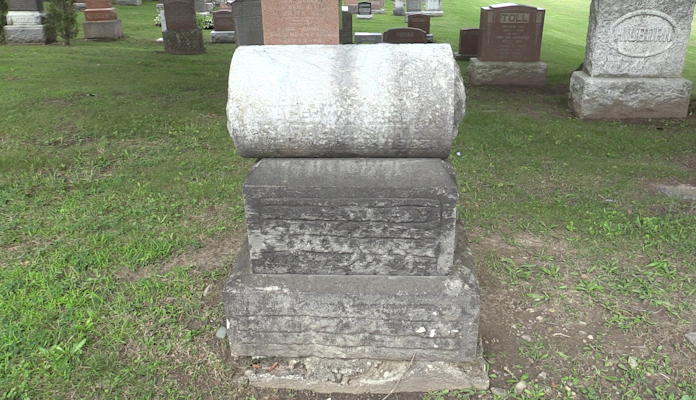Story about last Canadian woman charged with witchcraft makes its theatrical debut
Under a highly faded gravestone in the Blyth Union Cemetery, lies Maggie Pollock, the last Canadian woman accused of witchcraft.
"Maggie Pollock, was a local Blyth woman who was a medium, and she grew up here and lived just three kilometers away from the Blyth Festival, so it's a really, really local story. In 1919, she was charged with witchcraft and it went all the way to the Ontario Supreme Court. That was the kind of big controversy of her life and that's what this play is all about," said Director of ‘The Trials of Maggie Pollock,’, Anne-Marie Kerr.
Pollock's journey from local visionary to national spotlight, is the centrepiece of the latest play at the Blyth Festival.
The 'Trials of Maggie Pollock' centres on a simple Huron County farm girl who had the uncanny ability to help people find lost items, who ended up on trial for "telling fortunes," which was considered illegal as recent as the 1930s.
"You know, the idea of people being witches is still very frightening to some people. Although it's still only 100 years ago, it's not that long ago. It should have been out of fashion to have anything in the courts that was related to witchcraft, by then, but that is what they brought her up on charges for," said Kerr.
Pollock served no jail time, but she was convicted of "telling fortunes" in 1920, and ordered to stop practicing her "occult science."
While she was persecuted for her alleged witchcraft by the Ontario courts in Huron County, Pollock was revered.
 The gravestone of Maggie Pollock near Blyth, Ont. The last Canadian woman accused and convicted of witchcraft. (Scott Miller/CTV News London)
The gravestone of Maggie Pollock near Blyth, Ont. The last Canadian woman accused and convicted of witchcraft. (Scott Miller/CTV News London)
She not only helped neighbors and friends find lost, missing, or stolen items, she had inquiries for help from as far away as Florida and California. Even the local police used her to help try and find missing children.
"She helped the community. People who had lost something. Bales of hay, jewelry, they could go to her and she had a spirit guide that helped her, help them find things," said Kerr.
For the actress playing Pollock, this play is the latest example of the Blyth Festival's ability to take a unique local story and adapt it for the stage.
"It's just really interesting for people to be able to see their own stories, which I think is why the festival has survived for 50 years, because they're telling stories of the people of the community," said Caroline Gillis, who plays Pollock.
CTVNews.ca Top Stories

DEVELOPING One dead and two hurt in Stratford, Ont. shooting, suspect also dead
Shocking new details have been released about Thursday night's triple shooting in Stratford, Ont.
No one knows what will happen with 'devastating' landslide blocking B.C. river: chief
The uncertainty of how a landslide blocking British Columbia's Chilcotin River will give way is a key concern for Chief Willie Sellars of the Williams Lake Indian Band.
Canada's Masse wins bronze in women's 200m backstroke at Paris Games
Canadian swimmer Kylie Masse has won a bronze medal in the women's 200-metre backstroke final at the Paris Olympics.
What your teen actually wants you to do when they are upset
Maybe a hug from a parent no longer solves problems for a teen as it did in their childhood. But when it comes to teenage mental health, adults can do a lot to help, according to new data.
Who is Imane Khelif? Algerian boxer facing gender outcry had modest success before Olympics
Algerian boxer Imane Khelif has landed in the middle of a divide about gender in sports after her Italian competitor, Angela Carini, pulled out seconds into their bout at the Paris Olympics.
She hit it off with the guy she met at the bar on vacation. Then he sent her an unexpected text message
When Giuseppe Morisani first suggested it, Skyler Mapes thought she must have misread his message.
Jury reaches split verdict in baby abandonment case involving Dennis Eckersley's daughter
A jury reached a split verdict on Friday in a case involving a mother charged with abandoning a newborn child in the woods in subfreezing temperatures.
An Olympian couldn't pay her rent. Flavor Flav and Alexis Ohanian stepped in to help
Olympic glory is thrilling, but it doesn’t always pay the bills. Veronica Fraley, a discus thrower on Team USA, shared as much earlier this week, when she told her followers on X that she was struggling to make ends meet.
U.S. athlete trapped in porta potty mishap gets toilet paper sponsorship
Track fans might remember Ellis as the runner who found herself stuck in a porta potty at the U.S. track trials, in a semi-panic as she banged on the door for 10 minutes trying to grab someone's attention, worried that her Olympic hopes were swirling away.




























